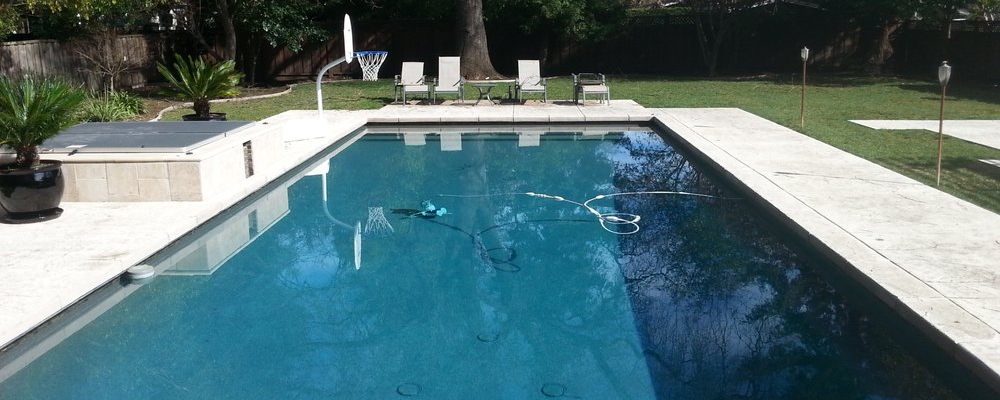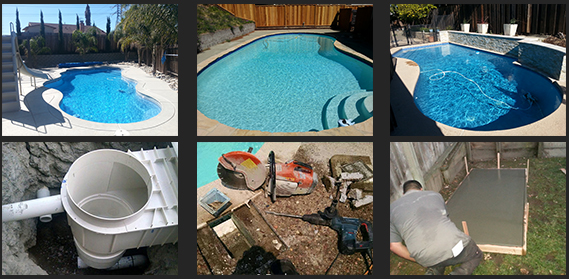Frequently Asked Questions
Find the answers to common questions below!

Can I service my swimming pool myself?
Servicing your swimming pool yourself is always an open option. The proper swimming pool maintenance however, requires weekly supervision on chemistry levels and performance of equipment. A swimming pool professional is trained to note any difference in the performance of your swimming pool whether its a change in chemistry or equipment. A professional can also troubleshoot any problems and determine what is needed to ensure your swimming pool is functioning properly and is safe for all users.
How long should I wait to enter my swimming pool after chemicals are added?
Generally it’s safe waiting 30 minutes to 1 hour after regular service chemicals are added in a swimming pool. If your swimming pool is being shocked or another non-regular service chemical is introduced its advised to wait until the recommended time given from a swimming pool professional.
Why should I hire a professional swimming pool company?
A professional swimming pool company will keep your safety and the condition of your swimming pool at heart. Even though you may have a clear swimming pool does not indicate that the body of water is safe to use or is safe for the swimming pool system. A professional company will balance and maintain a number of different chemicals to ensure the users are safe and to prevent the swimming pool and equipment from damage.
Do animals that enter the swimming pool pose a health risk to swimmers?
Most animals alive or dead that enter your swimming pool do not pose any health risk in a properly maintained swimming pool. Germs and bacteria carried in the swimming pool by animals are killed within minutes with the proper levels of chlorine present.
How long should I run my swimming pool pump per day?
First, you will need to find the gallons per minute of water that your pump circulates. You can usually find this out one of two ways, by either looking on the manufacturer label located on the motor end of the pump or by calling the manufacturer. Second, you need to know how many gallons of water your swimming pool contains. To calculate the amount of gallons your pool contains you could calculate the Length X Width X Average Depth X 7.48 for square pools and Area X Average Depth X 7.48 for oval pools. Now that you know the gallons per minute and the amount of gallons in your pool you can find your run time. For example lets just say you have a 20,000 gallon pool with GPM (gallons per minute) of 40. Grab that calculator and just “sub in” your measurements for mine.
40 (GPM) X 60 (minutes per hour) = 2400 gallons per hour
20,000 (gallons) / 2400 (gallons per hour) = 8.3 hours
Are chlorine tablets safe to use in my swimming pool?
When used properly chlorine tablets are safe to use in any swimming pool. Tablets should only be used in a chlorine tablet floater dispenser or in an inline chlorine tablet feeder. Tablets should not be used as your main source of chlorine nor should they ever be used in any skimmer as they will cause damage to the system and equipment.
Why is my swimming pool water cloudy?
Improper balance of chemistry, dirty or clogged filter system, and a lack of running your swimming pool pump are just a few reasons why your swimming pool water may be cloudy. There can be many other factors as well that can contribute to cloudy water. It is best to contact a swimming pool professional to address what the cause of your cloudy water is.
How often should I clean my swimming pool filters?
This answer varies from swimming pool to swimming pool. Generally guidelines on most swimming pool filters recommend that your filters are to be cleaned once the pressure gauge on the tank reads 10 psi higher than what it reads when the filter tank was installed or the last time the filters were cleaned. In some cases the readings on the filter pressure gauge will vary depending on your system and what equipment or water features you may be using. My recommendation is to have a consistent scheduled time planned out for your filters to be cleaned to utilize the full life expectancy of your filters.
How do I know if my swimming pool is leaking?
A simple test using a normal bucket can be used to determine whether you swimming pool is leaking. The following instructions to self-perform a leak test.
- Fill your swimming pool water to normal water level
- Place a bucket inside your swimming pool, usually on a step and fill bucket with swimming pool water to equal swimming pool water level.
- Place a mark inside the bucket marking the starting water level.
- Place a mark outside of the bucket marking the swimming pool starting level.
- Resume the normal equipment operation.
- Check both water levels after 24-48, after this time the samples are useless and the test will need to be reperformed.
- In case of rain or any other disruption the test becomes invalid and should be reperformed.
- Result determination; if the swimming pool water that is outside of the bucket has a greater difference from the mark and waterline than the water that is inside of the bucket, your swimming pool has a leak. If water loss is equal outside of the bucket to inside of the bucket, your swimming pool is not leaking.
